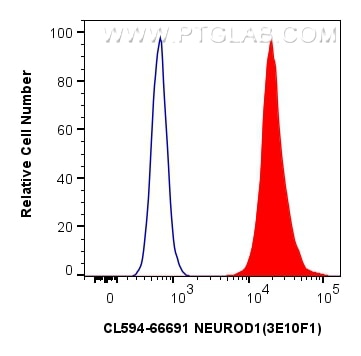Tested Applications
| Positive FC (Intra) detected in | SH-SY5Y cells |
Recommended dilution
| Application | Dilution |
|---|---|
| Flow Cytometry (FC) (INTRA) | FC (INTRA) : 0.40 ug per 10^6 cells in a 100 µl suspension |
| It is recommended that this reagent should be titrated in each testing system to obtain optimal results. | |
| Sample-dependent, Check data in validation data gallery. | |
Product Information
CL594-66691 targets NEUROD1 in FC (Intra) applications and shows reactivity with human samples.
| Tested Reactivity | human |
| Host / Isotype | Mouse / IgG1 |
| Class | Monoclonal |
| Type | Antibody |
| Immunogen | NEUROD1 fusion protein Ag27606 Predict reactive species |
| Full Name | neurogenic differentiation 1 |
| Calculated Molecular Weight | 356 aa, 40 kDa |
| Observed Molecular Weight | 40-50 kDa |
| GenBank Accession Number | BC009046 |
| Gene Symbol | NEUROD1 |
| Gene ID (NCBI) | 4760 |
| RRID | AB_2923923 |
| Conjugate | CoraLite®594 Fluorescent Dye |
| Excitation/Emission Maxima Wavelengths | 588 nm / 604 nm |
| Form | Liquid |
| Purification Method | Protein G purification |
| UNIPROT ID | Q13562 |
| Storage Buffer | PBS with 50% glycerol, 0.05% Proclin300, 0.5% BSA, pH 7.3. |
| Storage Conditions | Store at -20°C. Avoid exposure to light. Stable for one year after shipment. Aliquoting is unnecessary for -20oC storage. |
Background Information
NeuroD is a member of the basic helix-loop-helix (bHLH) family of transcription factors. The basic helix-loop-helix (bHLH) proteins are transcription factors that are required for several aspects of development, including cell type determination, terminal differentiation and sex determination. Members of the myogenic determination family, MyoD, myf5, myogenin and MRF4, all have bHLH domains.These proteins function by forming heterodimers with E-proteins and binding to the canonical E-box sequence CANNTG. Neuro D is expressed transiently in a subset of neurons in the central and peripheral nervous systems at the time of their terminal differentiation into mature neurons. Moreover, ectopic expression of Neuro D in Xenopus embryos induces premature differentiation of neuronal precursors and Neuro D can convert presumptive epidermal cells into neurons.The lack of NeuroD in the brain results in severe defects in development. Human mutations have been linked to a number of types of diabetes including type I diabetes mellitus and maturity-onset diabetes of the young. The calculated molecular weight of NEUROD1 is 39 kDa, but the modified NEUROD1 protein is about 45-50 kDa.
Protocols
| Product Specific Protocols | |
|---|---|
| FC protocol for CL594 NEUROD1 antibody CL594-66691 | Download protocol |
| Standard Protocols | |
|---|---|
| Click here to view our Standard Protocols |



